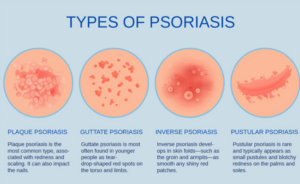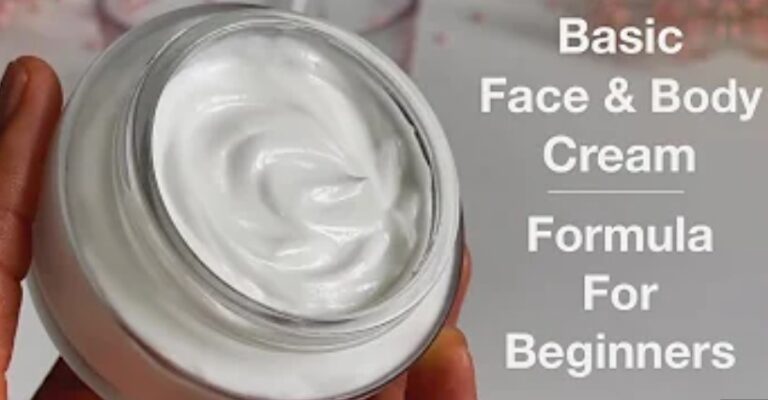Skincare for Psoriasis
It’s important to find a skincare routine and treatment plan that suits your needs and consult your healthcare professional for proper guidance and support.

What is Psoriasis?
Psoriasis is a chronic autoimmune skin condition which means that your body’s immune system starts overacting and causing problems, this disease affects millions of people worldwide. It causes the rapid buildup of skin cells, resulting in dry, itchy, and inflamed patches on the skin. While there is no cure for psoriasis, skincare is crucial in managing and alleviating symptoms.
Common types of psoriasis
- Plaque psoriasis (psoriasis vulgaris): Its symptoms are dry skin lesions
- Scalp psoriasis: It can occur on parts of your scalp or the whole scalp.
- Nail psoriasis: It causes your nails to develop tiny dents or pits, become discoloured or grow abnormally.
- Guttate psoriasis: causes small (less than 1cm) drop-shaped sores on your chest, arms, legs and scalp.
- Inverse (flexural) psoriasis: It can cause large, smooth patches of skin in the armpits, and groin between the buttocks and under the breasts.
- Pustular psoriasis: Pustular psoriasis is a rarer type of psoriasis that causes pus-filled blisters (pustules) to appear on your skin. Here are different types of pustular psoriasis that affect different parts of the body.
- Generalised pustular psoriasis or von Zumbusch psoriasis
- Palmoplantar pustulosis
- Erythrodermic psoriasis
Here are some important things to consider when it comes to skincare for psoriasis:
Also, remember that this condition varies from person to person therefore what works for one individual may not work for another.
Moisturize Regularly:
Moisturizing is key to keeping the skin hydrated and reducing dryness, a common psoriasis symptom. Opt for fragrance-free, hypoallergenic moisturizers and apply them generously to the affected areas at least twice daily. Look for moisturizers that contain ingredients like ceramides, hyaluronic acid, and glycerin, which help lock in moisture.
Avoid Harsh Soaps and Cleansers:
Many conventional soaps and cleansers can strip the skin of its natural oils and aggravate psoriasis symptoms. Instead, opt for mild, non-soap cleansers or moisturizing body washes. Avoid products with fragrances, dyes, and other potential irritants.
Warm Baths with Soothing Additives:
Soaking in a lukewarm bath can help soften psoriasis plaques and relieve itching. Add colloidal oatmeal, Epsom salts, or natural oils like olive or coconut to the bathwater. These additives can soothe the skin and provide temporary relief.
Gently Remove Scales:
Psoriasis plaques often develop thick scales that can be uncomfortable and aesthetically displeasing. To remove scales, gently soak the affected area in warm water for 10-15 minutes and then use a soft cloth or a gentle scrubbing brush to slough off the scales. Avoid picking or scratching, as it can worsen the condition.
Sun Protection:
Moderate sun exposure can benefit some individuals with psoriasis, as ultraviolet (UV) rays help slow down skin cell growth. However, it’s essential to protect your skin from excessive sun exposure and use sunscreen with a high SPF factor. Consult your healthcare provider to determine the appropriate amount of sun exposure for your condition.
Topical Medications:
Your doctor may prescribe topical medications such as corticosteroids, retinoids, or calcineurin inhibitors to manage psoriasis symptoms. Follow the instructions provided by your healthcare professional and apply these medications as directed. It’s important to note that some topical treatments can cause skin thinning, so they should be used cautiously and under medical supervision.
Avoid Triggers:
Psoriasis symptoms can worsen due to certain triggers. Common triggers include stress, infections, cold weather, certain medications, and skin injuries. Identifying and avoiding these triggers can help prevent flare-ups and manage your condition effectively.
Maintain a Healthy Lifestyle:
A healthy lifestyle can positively impact psoriasis. Regular exercise, a balanced diet, and stress management techniques like yoga or meditation can contribute to overall well-being and potentially help manage psoriasis symptoms.
Please seek Professional Advice:
Working closely with a dermatologist or healthcare professional specialising in psoriasis treatment is important. They can provide personalized guidance, prescribe appropriate medications, and recommend advanced treatment options such as phototherapy or systemic medications when necessary.





